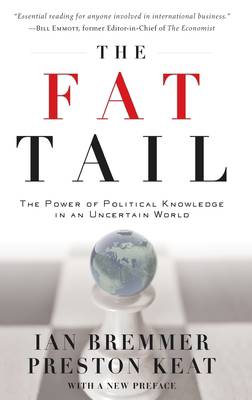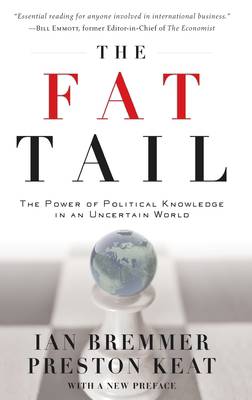
- Afhalen na 1 uur in een winkel met voorraad
- Gratis thuislevering in België vanaf € 30
- Ruim aanbod met 7 miljoen producten
- Afhalen na 1 uur in een winkel met voorraad
- Gratis thuislevering in België vanaf € 30
- Ruim aanbod met 7 miljoen producten
Zoeken
The Fat Tail
The Power of Political Knowledge for Strategic Investing
Ian Bremmer, Preston Keat
Hardcover | Engels
€ 75,95
+ 151 punten
Omschrijving
In recent years, investors have learned the hard truth that in the international economy, politics often matters at least as much as economic fundamentals for the performance of global markets. Too many companies and investors haven't yet learned to read the warning signs: their expertise lies much more in economics than politics, and the temptation is to hope that highly volatile situations such as the 2008 Georgia-Russia confrontation will be few and far between. But as Ian Bremmer and Preston Keat demonstrate, these scenarios--and their catastrophic effects on business--happen much more frequently than we imagine. On the curve that charts both the frequency of these events and the power of their impact, the 'tail' of extreme political instability is not reassuringly thin but dangerously fat.
This groundbreaking book is the first to both identify the wide range of political risks that global firms face and show investors how to effectively manage them. Written by two of the world's leading figures in political risk management, it reveals that while the world remains exceedingly risky for businesses, it is by no means incomprehensible. Political risk is unpredictable, but it is easier to analyze and manage than most people think. Applying the lessons of world history, Bremmer and Keat survey a vast range of contemporary risky situations, from stable markets like the United States or Japan, where politically driven regulation can still dramatically effect business, to more precarious places like Iran, China, Russia, Turkey, Mexico, and Nigeria, where private property is less secure and energy politics sparks constant volatility. The book sheds light on a wide array of political risks--risks that stem from great power rivalries, terrorist groups, government takeover of private property, weak leaders and internal strife, and even the "black swans" that defy prediction. But more importantly, the authors provide a wealth of unique methods, tools, and concepts to help corporations, money managers, and policy makers understand political risk, showing when and how political risk analysis works--and when it does not.
Authored by Ian Bremmer (author of the bestselling The J-Curve) and Preston Keat, the president and research director (respectively) of Eurasia Group, the world's leading political risk consultancy firm, The Fat Tail is an indispensable guide for anyone involved in the international economy.
This groundbreaking book is the first to both identify the wide range of political risks that global firms face and show investors how to effectively manage them. Written by two of the world's leading figures in political risk management, it reveals that while the world remains exceedingly risky for businesses, it is by no means incomprehensible. Political risk is unpredictable, but it is easier to analyze and manage than most people think. Applying the lessons of world history, Bremmer and Keat survey a vast range of contemporary risky situations, from stable markets like the United States or Japan, where politically driven regulation can still dramatically effect business, to more precarious places like Iran, China, Russia, Turkey, Mexico, and Nigeria, where private property is less secure and energy politics sparks constant volatility. The book sheds light on a wide array of political risks--risks that stem from great power rivalries, terrorist groups, government takeover of private property, weak leaders and internal strife, and even the "black swans" that defy prediction. But more importantly, the authors provide a wealth of unique methods, tools, and concepts to help corporations, money managers, and policy makers understand political risk, showing when and how political risk analysis works--and when it does not.
Authored by Ian Bremmer (author of the bestselling The J-Curve) and Preston Keat, the president and research director (respectively) of Eurasia Group, the world's leading political risk consultancy firm, The Fat Tail is an indispensable guide for anyone involved in the international economy.
Specificaties
Betrokkenen
- Auteur(s):
- Uitgeverij:
Inhoud
- Aantal bladzijden:
- 272
- Taal:
- Engels
Eigenschappen
- Productcode (EAN):
- 9780195328554
- Verschijningsdatum:
- 9/03/2009
- Uitvoering:
- Hardcover
- Formaat:
- Genaaid
- Afmetingen:
- 159 mm x 241 mm
- Gewicht:
- 544 g

Alleen bij Standaard Boekhandel
+ 151 punten op je klantenkaart van Standaard Boekhandel
Beoordelingen
We publiceren alleen reviews die voldoen aan de voorwaarden voor reviews. Bekijk onze voorwaarden voor reviews.











